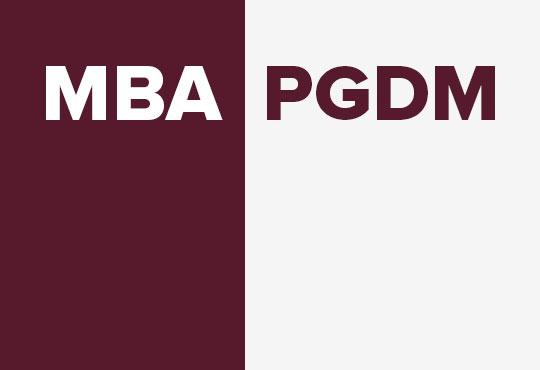
What Is Difference Between MBA and PGDM
Overview
While looking for the best management programs, you must have thought about this question - A PGDM or an MBA? You learn that several of the business schools you really want to attend are actually providing a PGDM degree even though what you're truly looking for is an MBA program. Why is it referred to as a Post Graduate Diploma in Management program rather than an MBA degree program?
The terms MBA and PGDM stand for Masters in Business Administration and Post Graduate Diploma in Management, respectively. There are several notable parallels and variations between the two programs, despite the fact that both are provided by renowned B-schools that last for two years, and are designed to prepare students for lucrative management careers.
All candidates seeking to enroll in a postgraduate management program have struggled with the challenge of choosing between an MBA and a PGDM. Candidates frequently experience difficulty since they are not fully aware of the similarities or differences between an MBA and a PGDM. To learn more about the differences, read the blog below.
What Is The Difference Between MBA and PGDM?
MBA Degree vs. PGDM Degree
PGDM programs are offered by several Indian Institutes of Management (IIMs) and other prestigious B-Schools, including the Firebird Institute of Research and Management. Most of these institutions are independent organizations (not affiliated with any University), and there is merely a distinction in nomenclature, but there is no professional difference. The job market highly values both MBA and PGDM as their credentials and curricula are the same.
Syllabus
The curriculum for MBA courses is typically created by the university. Universities frequently fall behind and update their course offerings every few years.
However, each institute chooses its own PGPM or PGDM programs. This allows the course program some flexibility. Every year, the curriculum is modified in accordance with business needs. PGDM would be a better option for persons who are interested in the corporate sector or wish to start their own businesses.
Fraudulent Behavior
Students should exercise caution while applying for PGP or PGDM courses because they are provided by autonomous bodies. Even though they lack the required accreditation status, many smaller colleges and institutes make claims.
Universities are the ones that provide MBA degrees, therefore the likelihood of false claims is decreased. A legitimate accreditation is what management candidates should seek.
Focus
Core subjects are the same for both PGDM and MBA programs. But rather than taking a more practical approach, most MBA programs emphasize management's academic and technical parts.
On the other hand, PGP or PGDM courses are more industrially focused and place more emphasis on developing skills based on market demands. Thus, due to high industry-related exposure and updated curriculum, PGDM candidates perform very well in interviews and get placed in top companies with higher CTCs than MBA candidates.
Cost
It has been noted that most MBA programs charge lesser tuition than PGP or PGDM programs. This may be the case because most MBA programs are offered by government-approved colleges. Government subsidies and financial aid are provided to certain colleges, making degrees more affordable for students. Although, there are MBA programs that have expensive tuition fees as well.
In the case of the PGP or PGDM degree program, students are responsible for covering the whole cost. This is not a firm rule, though.
To Wind Up:
In response to shifting corporate demands and industry trends, business schools that offer the PGDM program may alter their curricula. To give their students cutting-edge instruction, they may swiftly adopt new models, techniques, and technology. Firebird Institute of Research and Management goes through this modification in a time-based way, usually every three to five years.
Private b-schools that provide PGDM programs help their students by bringing in visiting lecturers from other countries for an improved educational experience. In addition to these, business schools, particularly those that offer on-campus PGDM programs, place a strong emphasis on the overall development of students through courses and activities based on soft skills and leadership, extracurricular activities, and close industry interaction through guest lectures. Our Firebird institute is very keen on this, so we follow the unique 70:30 module, where 70 % is practical exposure (industrial training) and 30 % is academic studies. As we believe mostly soft skill development and practical orientation will help the students in their future endeavors, Firebird has stepped forward to set up this unique feature.
Before making any decisions, you fully comprehend the value propositions, offers, and industry perspectives of any program to which you want to devote two years of your life to.
Share This Blog, Choose Your Platform!
RELATED BLOGS

Overview: When it comes to pursuing a PGDM/MBA ...
Read More
Overview: When considering an MBA/PGDM program,...
Read More
In the heart of Tech Innovations, vibrant energy p...
Read More
Overview Feeling nervous about interviews? Resear...
Read More
In today's rapidly evolving business landscape, th...
Read More
Have you finished your bachelor's degree recently ...
Read More
In today's fast-paced business environment, the ro...
Read More
Principles of Statistics Management: Its applicati...
Read More
How do Business Analysts Drive Business Success? ...
Read More
Introduction Leadership is the driving force behi...
Read More
Comments